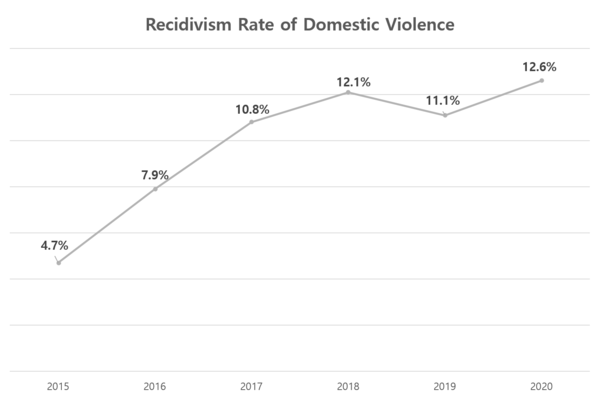
Do you know the case of the woman who was murdered by her ex-husband in Gangseo-gu three years ago? The perpetrator Kim Jongsun visited his ex-wife and murdered her. Later, Kim's daughter revealed through a national petition that her mother and herself had suffered from domestic violence for decades, raising social interest in the seriousness of domestic violence. However, three years later, domestic violence rates remain high. In particular, COVID-19 has intensified the problem. As everyone stays at home longer, some people are suffering from violence in their homes from which they cannot escape.

Endless domestic violence
Domestic violence refers to acts between family members involving not only physical violence but also mental and property damage. Among these incidents, violence that leads to serious physical damage has continued in recent years. In October last year, a girl, Jeongin, died from abuse by her adopted mother. The discovery of skull fractures and brain damage shocked people, and social controversy erupted after it was revealed that the police had failed to prevent the accident even though there were several reports of child abuse. Although voices to eradicate domestic violence have been raised for several years, victims such as Jeongin continue to suffer. On February 10, a three-year-old girl was found dead in a mummified condition in a villa in Gumi. The incident plunged Korean society into chaos when it was revealed that she had been neglected for six months after her death, and the person who claimed to be her maternal grandmother was revealed to be the girl's mother. There was another incident last year in which a husband who had been subject to a restraining order against his wife after injuring her in the head, went to her house and sprayed gasoline on her, causing burns all over her body. Like these incidents, domestic crimes are occurring among people of all ages and backgrounds.
Including these cases, the number of cases of domestic violence is increasing year by year. In particular, the number of cases of child abuse in 2020 affected by COVID-19 increased significantly compared to the previous year. According to the "2020 Annual Report of Child Abuse" submitted to the National Assembly Health and Welfare Committee by the Ministry of Health and Welfare this year, child abuse incidents increased from 30,045 cases in 2019 to 39,005 cases in 2020, a 29% increase. Opinions are divided on the causes of increased domestic violence incidents. There has been a phenomenon that the number of reports surged whenever an incident that caused a national sensation happened. When the Ulsan stepmother child abuse case, in which the stepdaughter was beaten to death, became known in 2013, the annual number of reports increased by nearly 40% the following year. As social interest in domestic violence grows, citizens are actively reporting it. However, given that there is an increase of violent cases where people die rather than simple abuse, the increased time spent at home due to COVID-19 is thought to be the cause. Further, Jeong Ikjoong, a professor of Social Welfare at Ewha Womans University, said, "In the pandemic situation, it is becoming more difficult for teachers and doctors to report abused people."1) The situation in which it is difficult to detect signs of abuse due to school closures and non-face-to-face counseling of the counseling centers is also pointed out as a factor.


Unpunished crime
Since domestic violence occurs within the family, it is often not easily revealed. Han Yunjeong, an activist at the Korean Women's Hot Line, said, "If women report violence by their husbands, they have to worry about retaliation and social criticism. If a fine is imposed, the fine may affect the victim because the victim and the perpetrator are an economic community together."2) Social perceptions of domestic violence, which simply regard it as a private problem such as simple discipline or a marital fight, make people around the victim hesitate to report it. Even if the violence is reported, the perpetrators can easily avoid punishment. In many cases, investigative agencies respond passively under the provisions of "Respect for Victims' Intentions" in the Domestic Violence Punishment Act. The provision for respecting the victim's intention refers to the situation where the victims can express their intention that they do not wish to punish the perpetrator. Due to this provision, only a few perpetrators are arrested. According to the 'Analysis of Domestic Violence Offenders' submitted by National Assembly member Lee Hyungseok from the National Police Agency, there were 249,366 domestic violence perpetrators between 2015 and 2019, of which only 2334 were arrested. Those arrested for domestic violence accounted for only 0.93% of the total number of perpetrators. Also, the prosecution rate is decreasing every year. According to the Ministry of Justice, the prosecution rate for domestic violence fell from 18% in 2011, 13% in 2014, to 8.5% in 2016.3) Therefore, domestic violence is not properly punished even if it is reported.
Moreover, it is becoming difficult to protect the victims. The perpetrators could commit crimes again by threatening the victims. According to the data submitted by Song Kiheon, a member of the National Assembly, from the Ministry of Justice, the recidivism rate of domestic violence offenders increased from 4.7% in 2015 to 12.6% in 2020.4) More perpetrators are threatening the victims to prevent them from reporting and then commit violence again. If the victim does not want punishment for the perpetrator, the sentence can be lowered. On October 21, a man was sentenced to two years of probation for committing violence against and destroying the property of his mother in April last year. Even though he was sentenced to probation for the threats in 2019, the man was violent again. However, he was sentenced to only two years of probation because his mother did not want punishment. The punishment for the perpetrator is not decided by the judiciary but passed on to the victim. Also, due to the prolonged COVID-19 situation, it is becoming difficult to intervene in domestic violence issues. Je Obok, co-chairman of the National Council of Domestic Violence Counseling, pointed out that, "When conducting a phone consultation with the victim, they sometimes say, 'My husband is at home because he is working at home today.'"5) There is a limitation in that active intervention is difficult as interview counseling has been suspended and phone counseling is being conducted instead. This lack of protection for the victims leads them to become reluctant to report and creates a vicious cycle in which domestic violence is repeated.


Discussion on COVID-19 and domestic violence
Continued discussion of the bill
Amid these problems, criticism has been raised that the measures are not enough. Since January 21 this year, the National Assembly has recognized the limitations of the bill and has been implementing a revision to the Domestic Violence Punishment Act. The amendment largely focuses on strengthening punishment for the assailant and protecting victims. First of all, emergency measures have been added to respond to domestic violence cases that can lead to serious crimes. Through this, it is possible for the police dispatched to the scene to arrest domestic violence perpetrators under the Criminal Procedure Act. In fact, on October 17, there was a case where a perpetrator was arrested for breaking into his wife's house. He was subject to a court order that prohibited him from entering his wife's residence due to his habitual domestic violence. But he violated it.6) In this case, it can be seen that sanctions against domestic violence offenders are further strengthened. It is also noteworthy that visitation rights have been restricted in the process of requesting a victim protection order. Previously, there was a problem that children affected by domestic violence were forced to meet their parents, the perpetrators, due to visitation rights. The revised bill has answered the concerns about the harm this causes by removing it. It can be seen that active domestic violence response is closer to being achieved through the revision of the law.
Despite these amendments, experts are proposing additional measures for improvement. On September 17, the National Assembly's legislative investigation office said that the introduction of a mandatory arrest system, similar to that used in 23 states in the US, should be considered. The mandatory arrest is a system in which police dispatched to the scene of domestic violence should arrest the perpetrator. In addition, the police should not ask the victim if they want to see the arrest or punishment of the perpetrator. Heo Minsook, an investigator at the National Assembly's legislative investigation office, said, "In Korea, the perpetrator can be arrested under the current law, but domestic violence is not recognized as a crime after which the perpetrator is highly likely to flee or destroy evidence."7) For legislation centered on sanctions against perpetrators, she suggested the introduction of mandatory arrest. In addition, it is suggested that strict follow-up management is necessary for family protection cases. In the UK, the "Multi Agency Risk Assessment Conference'' has been established nationwide to continuously manage the perpetrators. In response, Shin Sanghee, head of the policy team of 'Shelter Oraetteul', a subsidiary organization of the Korean Women's Hot Line, said, "In Korea, even if the court issues a consultation order, there is no proper way to enforce it if the perpetrator does not respond."8) She emphasized the importance of establishing a follow-up system for perpetrators. In conclusion, it will be important for our society to discuss domestic violence-related bills again and ensure their effectiveness.
As long as there's violence, it's not 'family'
Numerous domestic violence incidents have angered society. However, it is still happening. In addition, there is a risk of it increasing due to the prolonged COVID-19. Domestic violence can escalate from simple violence to violent crimes such as murder. Therefore, it is necessary for society as a whole to recognize that domestic violence is no longer a family problem but a clear crime. It is also important to strengthen support measures to protect victims and establish an improved system.
1) Lee Seungyeop, "From Jungin to Yongin and Gumi... Why Is Child Abuse on the Rise?", Hankook Ilbo, February 17, 2021
2) Moon Kwangho, "Domestic Violence That Can't Be Reported Even if the Victim Wants Punishment… 'Family Protection Case' System That Is Far From Reality", Kyunghyang Shinmun, August 15, 2021
3) Seon Chorong, "[Domestic Violence] a Society That Cannot Punish 'Criminals'", Newspost, September 7, 2021
4) See Footnote 3
5) Nam Hyejung, "Domestic Violence Became More Difficult to Report Due to "Staying at Home"", Segye Ilbo, November 24, 2020
6) Lee Jungha, "Domestic Violence Husbands Who Violated the "Restraining Order" Are Imprisoned", Hankyoreh, October 18, 2021
7) Lee Yumi, ""Korea Is Tolerant of Domestic Violence... Considering the mandatory arrest of the perpetrator"", Yonhapnews, September 19, 2021
8) Kim Taeyoung, "The 'Family Information Protection Case' System That Cannot Protect Home··· "We Need to Create An Active Response Environment For Investigative Agencies"", Sedaily, August 26, 2021
Yoon Kim Eunji / Reporter
smt_kej@sookmyung.ac.kr
Park Sung Iyoung / Reporter
smt_siy@sookmyung.ac.kr


